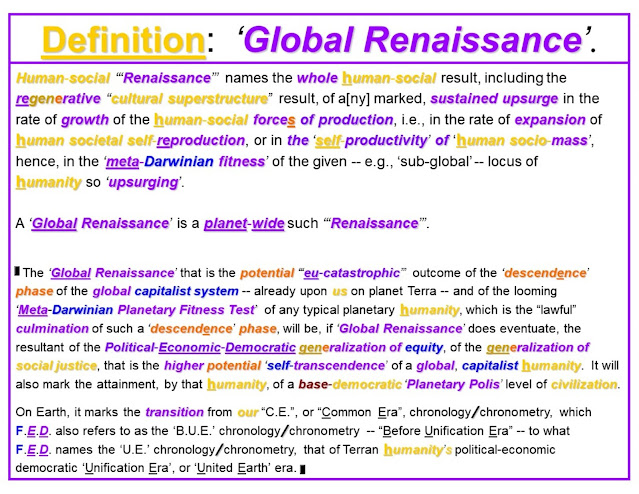
“Marxism-Leninism” is a Fraudulent Misnomer. Leninism
is not Marxian.
Leninism is anti-Marxian, and ‘ante-Marxian’. Leninism
is [state-]capitalist.
Dear Reader,
Leninism is a bloody, ruling-class
ideology
-- an ideology
in Marx’s sense, and an object to be answered by withering critique in Marx’s
sense.
The Leninist ideology was used
by neo-Jacobin, putschist, [state-]capitalist parties to seize dictatorial
state power from ‘sub-capitalist’, crypto-feudal ruling classes, and/or from
weak, capitalist-imperialism-suppressed, comprador bourgeoisies, in the largest
‘proto-national’ territories of the global “semi-periphery” --
‘semi-peripheral’ to the geographical capitalist core of capitalist-imperialist
nation-states.
Its effect was to enrich the tiny
new, state-bureaucratic ruling classes of the resulting one-party state,
police-state, totalitarian, ‘proto-state-capitalist’ regimes, at the
expense of the vast majority of the rest of the populations of those
territories.
These new, state-bureaucratic
ruling classes employed state-terrorism to perpetrate a new channel of
original/primitive accumulation of state-owned industrial capital on the backs
of the thereby hyper-exploited peasantry and nascent wage-working class
majorities there.
These new, state-bureaucratic
ruling classes did so in order to construct national military-industrial
complexes designed to be sufficient to save the power of those new,
state-bureaucratic ruling classes from external overthrow by military invasions
from the capitalist geographical core, by order of the capitalist-imperialist
nation-states’ private-capitalist ruling classes. This ‘‘‘salvation’’’ of the new
state-bureaucratic ruling classes’ power to rule was intended to be via
deterring those private-capitalist ruling classes from military attacks upon
the state-bureaucratic ruling classes’ subjugated national territories.
This induction of
military-industrial-complex-forming “primitive accumulation” and
industrialization, by the capitalist core, in these semi-peripheral territories,
by threat of military overthrow of their new, bureaucratic ruling classes is
the key initial transmission mechanism by which the private-capitalist
world-market “law of value” also shaped these nascent, ‘proto-state-capitalist’
nation-states, at a time when their vast territories afforded them a degree of
autarkic potential, and a transiently-survivable relative isolation from
international trade.
These ‘proto-state-capitalist’ transients
were destined to bifurcate into one of two main more-sustainable trajectories.
Either new popular revolutions
therein would succeed in transitioning them to state-dominated, mixed
private-capitalist/state-capitalist, nominally-capitalist-democratic authoritarian
oligarchies, the democratic aspirations of their people thwarted by the
still-dominant power of the core, capitalist-imperialist nation-states.
Or, their initial, semi-autarkic
‘proto-state-capitalist’ formations, relatively isolated from world market
international trade, would give way, on the backs of failed internal popular
revolutions, to full-fledged state-capitalism, on the ‘national
super-corporation’ model, dependent upon success in international-commerce, and
tolerant of subordinated elements of private capitalism under the domination of
the sustained dictatorship of their Leninist state-bureaucratic ruling classes.
This is all prelude to, and
part and parcel of, the globalization of proletarianization -- the formation of
a world-wide working class, and the conversion of “hinterland”,
‘evolutely-«aufheben»-conserved’, archaic social formations into full-fledged,
hybrid, state/private capitalist nation-states, increasingly state-capitalism-leaning
-- ever-more-so with every amplitude-augmented “global great recession”.
This universalization of the
wage-labor-relation-of-production must precede the formation of a global
polity, and of a working class universal interest, that, alone, can potentiate a
global transition to a ‘trans-capitalist political-economic democracy’, to
‘global renaissance’, and to global human flourishing.
For more information regarding
these Seldonian
and Marxian insights, please see --
For ‘poster-ized’ visualizations of many of these Seldonian
insights -- specimens
of ‘dialectical art’ -- see:
¡ENJOY!
Regards,
Miguel Detonacciones,
Member, Foundation Encyclopedia
Dialectica [F.E.D.],
Participant, F.E.D.
Special Council for Public Liaison,
Officer, F.E.D.
Office of Public Liaison.
SOLUTION –
‘Equitist
Political-ECONOMIC DEMOCRACY’;
BOOK:
MARX’S MISSING
BLUEPRINTS
Free of Charge Download
of Book PDF --
http://www.dialectics.info/dialectics/Applications.html
Hardcover Book Order --
http://www.dialectics.info/dialectics/F.E.D._Press.html
https://www.etsy.com/shop/DialecticsMATH





No comments:
Post a Comment